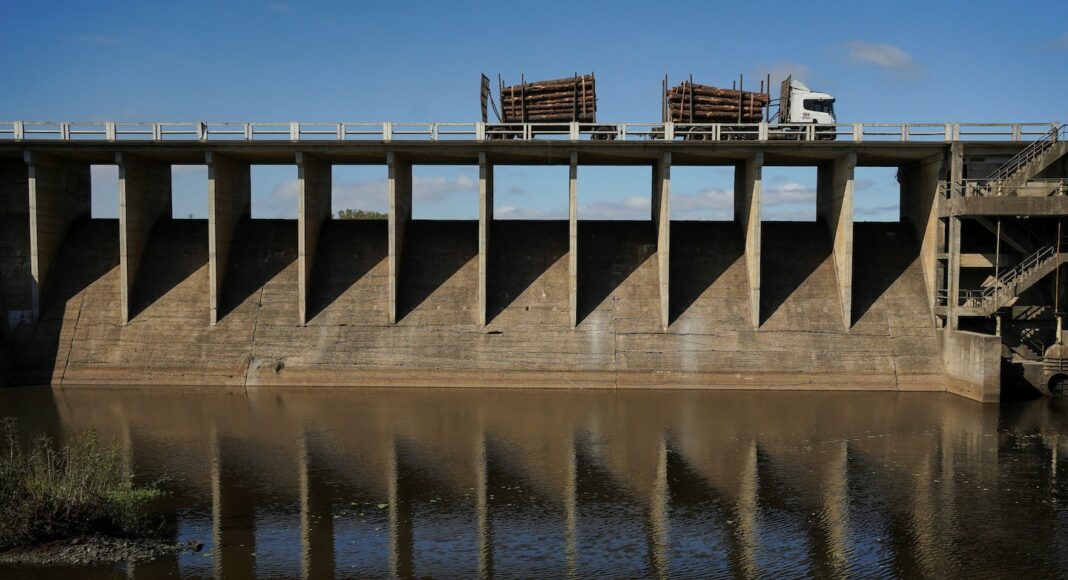Ειδήσεις Ελλάδα
Comment on this storyComment
MONTEVIDEO, Uruguay — When the headaches began, María Sosa thought back to breakfast a few days earlier.
She had been boiling eggs in their kitchen. Her husband, drinking water, asked if she thought it tasted off.
“A looked at the pot and it was white, tainted with salt,” said Sosa, 62. “I knew right there: This was going to be a problem.”
Uruguay, beset by high temperatures and drought, is running out of fresh water. Monte, the capital, is down to just a few days’ supply.
This small, affluent South American nation is not alone in its suffering. Historically hot, dry conditions are harming crops and shaking economies across the Southern Cone. Amid global climate change, the region is warming more rapidly than the rest of the world. Precipitation during the last four months of 2022 fell to half the average, the lowest level in 35 years.
Dying crops, spiking energy bills, showers once a week. In South America, the climate future has arrived.
Andean glaciers have lost more than 30 percent of their area since the 1980s, according to the U.N. World Meteorological Organization. Central Chile is 13 years into its longest drought in at least a millennium. Argentina’s agricultural exports are expected to fall by 28 percent in 2023.
But in Uruguay, extreme weather has pushed authorities to an extreme response.
The Paso Severino reservoir, which proes fresh water to more than half the country’s 3.4 million people, is down to 5 percent of capacity. So the State Sanitary Works Administration secured permission this month to exceed the legal limits for sodium and chloride in public drinking water and has begun adding supply from the Río de la Plata, the estuary where the fresh water of the Paraná and Uruguay rivers meets the salt water of the Atlantic Ocean.
The result: The amount of sodium in the tap water has reached 421 milligrams per liter, the government announced last week. That’s more than twice the World Health Organization recommendation, 50 percent more than Uruguay’s previous authorized limit and 10 times the system’s historic levels.
Chloride has reached 686 milligrams per liter of chloride, also 50 percent more than the previous authorized limit.
What’s more, the water tastes distinctly salty.
“For the population in general, it is not a health problem,” Public Health Minister Karina Rando told reporters when the measure was announced. But her ministry issued a warning: “As for people with hypertension, kidney diseases and people who have a medical recommendation for a salt-restricted diet, it is recommended to take extreme blood pressure controls, not to neglect their medical controls and, if possible, consume bottled water.”
Sosa is among those affected. She suffers from hypertension; it took her a year to get her blood pressure under control.
Since her tap water turned salty, she has sharply cut her intake. “I used to drink around 30 or 60 ounces of water a day, and now I only drink two glasses,” she said. “I find myself saving whatever water is left from my husband’s tea, and we just have a mate or two a day. Our entire lives changed.”
In Barrio Nuevo Amanecer, Sosa’s neighborhood on the outskirts of Monte, the problem is widespread. In a country where the drinking water has been recognized as among the world’s purest, the cost of buying bottled water is busting family budgets.
Opposition politicians and some Uruguayans are blaming President Luis Lacalle Pou for what they say is incompetence or corruption. Protesters have chanted, “It’s not drought, it’s looting.”
“The crisis itself could have had a much more anticipated communication plan. Since last year there was a warning that the drought was going to continue,” said former environment minister Carlos Colacce. “From one day to the next we find out that the water has to start coming out salty.”
Lacalle Pou said the crisis did not take his government by surprise. “I don’t want to focus on what was not done,” he told reporters, but on new projects: a water treatment plant, a dam and a desalination plant imported from the United States.
What did catch Lacalle Pou by surprise was the boy who asked him about the water as he visited a primary school. “One question,” the boy said. “What is wrong? Why is the water so salty?”
The national government has suspended taxes on imported bottled water, and Monte is subsidizing purchases for vulnerable residents.
Through the city’s network of polyclinics, Monte Mayor Carolina Cosse said, health-care workers are identifying people at risk and doctors are giving “prescriptions” to vulnerable patients to be redeemed for bottles at local businesses. At least 70 percent of people who visited polyclinics in the past week suffered from high blood pressure, officials said.
“I haven’t used my prescription for water yet,” Sosa said. “I helped an 80-year-old neighbor to look for hers, because I could still buy water. But now I have to. I need to.”
Opposition parties have called on the health and environment ministers to testify on the crisis. “A water management mistake was made,” said senator opposition leader Enrique Rubio. “They ignored the problem.”
“We called for an interpellation not to discuss the projects but the management of the water crisis,” he said. “We are getting to a limit situation if it does not rain.”
Soledad Furtado is a co-owner of Parque Congelados, a supermarket in Monte’s Pardo neighborhood.
“The only question people ask us these days is about water,” she said. “They want to know if we’ve heard anything.”
“We limit purchases to 12 liters [about 3.2 gallons] a day, because we want to make sure that there is enough for everyone. People are using bottled water for almost everything these days.”
After months with little rain, any drop is cause for celebration. “Luckily, we started the day with rain,” German Ambassador Eugen Wollfarth tweeted Friday. “Very grateful to get wet.”
Herrero reported from Caracas, Venezuela, and Fernández Simon from Washington.



